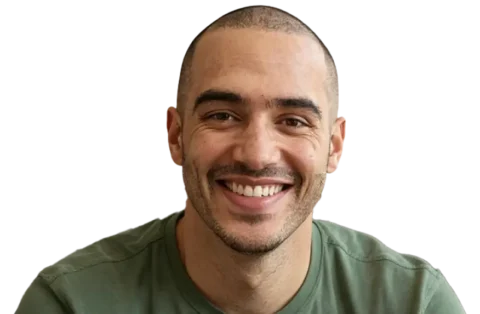What you’ll learn
This guide explores realistic, affordable alternatives to traditional rehab for opioid addiction. You’ll learn how outpatient care, virtual Suboxone treatment, and therapy can support recovery without putting life on hold, and how QuickMD makes it easier to get help from home.
Not everyone can press pause on life to check into a 30-day program. Whether it’s because of work, family responsibilities, or cost, going to a rehab center just isn’t realistic for a lot of people. It’s a reality we understand, but it doesn’t mean recovery is off the table.
You have real options that actually work, that are affordable and flexible. These alternatives to traditional rehab put you back in control. Whether it’s outpatient care, Suboxone® treatment, or therapy, there’s no one “right” way to recover. And that’s okay.
We know recovery looks different for everyone because we’ve helped people take those first steps in all kinds of situations. We also know that healing doesn’t require checking into a facility. What it does require is support, structure, and a plan that works for your life.
In this guide, we walk you through practical, accessible ways to get help outside of traditional rehab, options you can access while keeping your job, staying with your family, and building a more stable future. Let’s look at what’s possible when traditional rehab isn’t.
Why inpatient rehab isn’t the only path to recovery
For many people, inpatient treatment is the right choice.
A structured environment, round-the-clock support, and distance from daily triggers can make all the difference, especially in early recovery. If you’re in a crisis or dealing with complex health issues, inpatient rehab can be life-saving.
But what if inpatient care just isn’t possible?
Maybe you can’t take time off work. Maybe you’re caring for children or don’t have insurance that covers residential treatment. This is precisely where alternatives become so important. Your path to healing shouldn’t be closed simply because traditional inpatient care doesn’t align with your current circumstances.
Rehab alternatives like outpatient programs, virtual care, and Medication-Assisted Treatment have helped thousands of people recover, especially those dealing with opioid use disorder. These rehab options offer real flexibility while still giving you access to licensed providers, therapy, and long-term support.
The truth is, addiction treatment looks different for everyone. Whether you’re looking for ready-to-go rehab or more gradual options for rehab you can build around your current responsibilities, there are real, proven paths that work.
Rehab alternatives that work in real life
You don’t have to choose between recovery and your responsibilities. If inpatient treatment isn’t the right fit, there are several proven rehab alternatives that can support your recovery while fitting into your daily life.
Many of these options are more affordable, flexible, and accessible, without sacrificing quality care.
1. Outpatient addiction treatment: flexible support without staying overnight
Outpatient addiction treatment is one of the most common alternatives to rehab. You attend scheduled therapy, counseling, or group sessions several times a week, but you don’t stay overnight. This can work well if you have a stable home environment, a supportive network, and the motivation to stick with the program.
Outpatient treatment can be just as effective as inpatient rehab for many people, especially when paired with Medication-Assisted Treatment.
If you’re working through opioid addiction, this combo gives you medical support to manage cravings and withdrawal, along with the structure and accountability that help you stay on track.
It’s treatment you can actually stick with while keeping your job, caring for your family, and continuing with your day-to-day life.
2. Suboxone® and MAT: trusted treatment for opioid use disorder
Medication-Assisted Treatment, or MAT, is one of the most effective ways to treat opioid addiction, yet many people don’t hear enough about it. By combining medications like Suboxone® with supportive counseling, MAT helps stabilize brain chemistry while you develop the skills and strengths needed for lasting recovery
If you’ve been using opioids like fentanyl, heroin, or prescription painkillers, MAT can ease withdrawal symptoms, reduce cravings, and give your brain the room it needs to heal.
Why Suboxone® treatment works for opioid recovery
Suboxone® is one of the most researched and trusted treatments for opioid use disorder. It’s a combination of buprenorphine and naloxone that binds to the same receptors in the brain that opioids target, but in a safer, more controlled way.
Buprenorphine reduces cravings and withdrawal symptoms without causing the intense high that drugs like heroin or fentanyl do. Naloxone is included to help prevent misuse.
It’s FDA-approved for opioid addiction treatment and widely recommended by addiction medicine experts.
And services like QuickMD make Suboxone® and MAT even more accessible. You can meet with a licensed provider through telemedicine, get prescribed Suboxone® if eligible, and begin MAT from home, sometimes the same day you reach out.
3. Therapy for substance use: a core part of lasting recovery
Therapy plays a big role in healing from addiction, no matter what kind of treatment path you’re on.
This kind of support helps you get to the root of things. Why? Substance use is often tied to deeper pain, trauma, or mental health struggles. Therapy gives you the room to work through those patterns. You’ll start to recognize triggers, shift how you respond, and build tools that actually last long after treatment ends.
Even if you’re not ready for a full program, starting with therapy can be a solid first step. It’s often included in other substance use treatment options, but it also stands on its own as a meaningful way to begin your recovery.
Therapy is often part of other substance use treatment options, like outpatient programs and MAT. Still, you can also pursue it independently, especially if you’re early in the process and just need a starting point.
4. Comprehensive addiction treatment: healing mind and body together
You might also find support through more rounded approaches to recovery. This might include yoga, mindfulness, nutrition, exercise, acupuncture, or other supportive therapies that focus on the mind-body connection.
Keep in mind, though, that these options are not a substitute for medical treatment. They’re most effective when you combine them with evidence-based medical care (like MAT) and proper counseling. Think of them as powerful additions to your recovery toolkit rather than complete solutions on their own.
5. Online support groups and peer communities for addiction
Peer support is powerful. Sometimes hearing someone say “I’ve been there” can mean everything during recovery.
Online recovery communities, 12-step alternatives, and virtual support groups can give you some much-needed encouragement, accountability, and connection. While not a full treatment plan on their own, they can be an important part of a broader addiction recovery program.
Quick comparison of rehab options for addiction
| Option | Best For | What It Offers | Considerations |
| Inpatient Rehab | Severe addiction, unsafe environments | 24/7 care, structured setting | Time away from work/family, high cost |
| Outpatient Treatment | Milder addiction, stable home life | Flexible schedule, therapy while living at home | Less structure, more self-discipline needed |
| Suboxone & Medication-Assisted Treatment (MAT) | Opioid use disorder | Suboxone for opioid cravings, virtual doctor visits, therapy | Requires medical follow-up and routine |
| Therapy (CBT, group, etc.) | Emotional support, relapse prevention | Mental health care, coping skills | May not address physical withdrawal |
| Holistic Support | Wellness-focused recovery | Mindfulness, nutrition, exercise | Not a substitute for medical care; Works best alongside clinical care |
| Virtual Support Groups | Ongoing motivation | Peer connection, anonymous, accessible | Not a full treatment plan alone |
How to choose the best rehab option for your life
Not every recovery path looks the same, and that’s okay. When comparing rehab alternatives or deciding between outpatient addiction treatment and residential care, what matters most is choosing something that fits your life and gives you the support you need to stay consistent.
Here are a few things to consider:
- How severe is your substance use? If you’re dealing with heavy or long-term opioid use, more structured support, like Medication-Assisted Treatment, can help manage withdrawal and cravings early on.
- What does your daily life look like? If you’re working, caring for family, or can’t take time away, alternatives to rehab like telemedicine-based MAT, outpatient care, or counseling may be more realistic than inpatient programs.
- Do you have a safe, stable home environment? If your home environment makes it hard to stay focused on recovery, inpatient rehab may still be a great option. But if your home is supportive, many rehab options can happen right where you are.
- Are you ready to engage in treatment? Recovery doesn’t require perfection. But being willing to show up for appointments, take medications as prescribed, or attend therapy makes a big difference, especially with flexible, ready-to-go rehab options like QuickMD.
There’s no shame in choosing the path that works best for your situation. What matters most is taking that first step, however small it might seem.
Need help now? Here’s a simple place to start
If you’re reading this, feeling overwhelmed, or just thinking, “I need help today, not next month,” we hear you. Starting treatment doesn’t always mean checking into a facility or waiting weeks for an appointment. It can begin with one simple step.
If you’re looking for affordable opioid addiction treatment online, we can help. Whether you’re managing fentanyl withdrawal, struggling to stop heroin use, or trying to reduce cravings for prescription opioids, MAT through virtual care may be the answer.
Here’s what makes our approach different:
- Evidence-based, doctor-recommended care
- Non-judgmental, personalized support
- Affordable treatment with no long waitlists
- Same-day online booking
Whether you’re struggling with fentanyl, oxycodone, heroin, or even Kratom or Tianeptine, this kind of care can help you feel more like yourself again and take the first real step forward. You don’t need to do everything all at once. You just need to begin.
Frequently asked questions about rehab alternatives
Are online addiction treatment programs legit?
They can be. Telemedicine-based programs, especially those that offer licensed providers, FDA-approved medications, and access to therapy, are increasingly recognized as safe, effective options.
Services like QuickMD use real, board-certified doctors and licensed providers who follow evidence-based treatment models. While not a fit for everyone, virtual care is a real and growing part of modern addiction treatment.
Can rehab alternatives work if I’ve relapsed before?
Yes. A relapse doesn’t mean you’ve failed or that outpatient or at-home treatment can’t work. In fact, many people use relapse as a turning point to find an approach that fits them better.
Rehab alternatives like MAT, outpatient programs, or virtual care can offer more flexibility and consistency, especially if you’re ready to re-engage in treatment with support that fits your daily life.
What’s the most affordable alternative to rehab?
Medication-Assisted Treatment via telemedicine is often one of the most affordable and effective options, especially for opioid addiction. Services like ours offer virtual visits at a fraction of the cost of residential rehab, with same-day access to providers and ongoing support.




